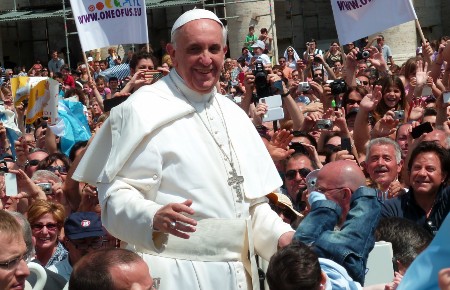 Hi readers, it seems you use Catholic Online a lot; that's great! It's a little awkward to ask, but we need your help. If you have already donated, we sincerely thank you. We're not salespeople, but we depend on donations averaging $14.76 and fewer than 1% of readers give. If you donate just $5.00, the price of your coffee, Catholic Online School could keep thriving. Thank you. Help Now >
Hi readers, it seems you use Catholic Online a lot; that's great! It's a little awkward to ask, but we need your help. If you have already donated, we sincerely thank you. We're not salespeople, but we depend on donations averaging $14.76 and fewer than 1% of readers give. If you donate just $5.00, the price of your coffee, Catholic Online School could keep thriving. Thank you. Help Now >
What do the Russians know that we don't? Russian scientists hurredly constructing massive 'NOAH'S ARK' to preserve every species on the planet
FREE Catholic Classes
It's being described as a "Noah's Ark" designed to serve as a bank for the preservation of every living thing on the planet. Moscow State University is building the world's first comprehensive ark, which will serve as a bank for the DNA of every living organism on the planet.
Highlights
Catholic Online (https://www.catholic.org)
12/30/2014 (9 years ago)
Published in Technology
Keywords: Noah's Ark, Russia, knowledge, secret, seed bank, repository, Moscow University
LOS ANGELES, CA (Catholic Online) - "I will call the project 'Noah's Ark,'" announced MSU rector, Viktor Sadivinchy. The university was given a grant of $194 million (1 billion rubles) to initiate a project that will serve as a repository for the DNA for every living organism on the planet.
The Ark will be situated on a university campus and is expected to take up to 160 square miles of space.
Send food to Christians in urgent need.
Sadivinchy announced they would keep "various cellular materials and information systems," adding "not everything needs to be kept in a petri dish." His goal is to complete the project by 2018, giving workers just three years to complete everything.
There are literally billions, perhaps trillions of different forms of life on the planet, so it is unlikely the Ark will feature every single organism possible, however they could make a lot of progress. The Russian Ark would be following a British project which preserves the DNA of endangered species and the American National Museum of Natural History, which presently has the world's largest collection at 4.2 million samples.
Various universities, museums, and private individuals have much smaller arks of their own. Seed banks and collectives also preserve local species of native seeds.
The reasons for this vary. Seed banks in particular are important for preserving native species of crops that are steadily being replaced by GMO crops worldwide. It is feared that GMO crops could fail or suffer some other problem, and since they tend not to fruitfully reproduce (by design or by license) they could someday fail or be banned. If native species have been cut down in favor of the GMO varieties, then seed banks will provide the natural solution.
Some people say they fear a disaster of apocalyptic proportions. Global warming, global war, or some other sudden disaster could overtake the planet, forcing survivors to rely on such banks to rebuild their communities.
Is there something the Russians and others know that we don't? Is something coming? The short answer is yes, in fact, it has already arrived.
While the apocalypse sounds like an astounding reason for a rational person to consider, it should be noted that scientists now believe we are in the midst of a mass extinction event and that as much as 90 percent of all the varieties of species on Earth could go extinct in the centuries to come. Some estimates say that up to 200 species of organism go extinct on the planet every day, a rate unseen since prehistoric times.
 Hi readers, it seems you use Catholic Online a lot; that's great! It's a little awkward to ask, but we need your help. If you have already donated, we sincerely thank you. We're not salespeople, but we depend on donations averaging $14.76 and fewer than 1% of readers give. If you donate just $5.00, the price of your coffee, Catholic Online School could keep thriving. Thank you. Help Now >
Hi readers, it seems you use Catholic Online a lot; that's great! It's a little awkward to ask, but we need your help. If you have already donated, we sincerely thank you. We're not salespeople, but we depend on donations averaging $14.76 and fewer than 1% of readers give. If you donate just $5.00, the price of your coffee, Catholic Online School could keep thriving. Thank you. Help Now >
If a keystone species is lost - meaning an organism that is essential to a biome, then ecological collapse could follow. Such collapses, even though they are typically local, have significant impacts on human populations. An ark would be just the solution to try and restore lost species in a crisis.
---
'Help Give every Student and Teacher FREE resources for a world-class Moral Catholic Education'
Copyright 2021 - Distributed by Catholic Online








 Daily Readings for Friday, April 26, 2024
Daily Readings for Friday, April 26, 2024 St. Cletus: Saint of the Day for Friday, April 26, 2024
St. Cletus: Saint of the Day for Friday, April 26, 2024 Prayer before the Closing of the Day: Prayer of the Day for Friday, April 26, 2024
Prayer before the Closing of the Day: Prayer of the Day for Friday, April 26, 2024

